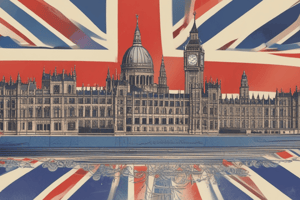Podcast
Questions and Answers
What is the core principle of parliamentary sovereignty?
What is the core principle of parliamentary sovereignty?
- Only the monarch can enact new laws.
- Parliament can only amend existing laws.
- Judiciary has the authority to override Parliament's laws.
- Parliament can make and unmake any law. (correct)
What does the negative limb of AV Dicey's orthodox view signify about parliamentary sovereignty?
What does the negative limb of AV Dicey's orthodox view signify about parliamentary sovereignty?
- Parliament can only create laws that do not conflict with existing laws.
- Parliament can be overridden by the judiciary if necessary.
- Parliament is required to consult other bodies before enacting laws.
- No person or body can set aside Parliament's legislation. (correct)
Which of the following statements about parliamentary sovereignty is true?
Which of the following statements about parliamentary sovereignty is true?
- Parliament can enact legislation that destroys its own sovereignty. (correct)
- Parliament's sovereignty is limited by international treaties.
- The courts can refuse to apply the latest Act of Parliament.
- Parliament can entrench its legislation indefinitely.
What is the role of the courts regarding Acts of Parliament?
What is the role of the courts regarding Acts of Parliament?
What is meant by the manner and form theory in the context of parliamentary sovereignty?
What is meant by the manner and form theory in the context of parliamentary sovereignty?
What historical event is associated with the ongoing political agreement concerning parliamentary sovereignty?
What historical event is associated with the ongoing political agreement concerning parliamentary sovereignty?
Which of the following best describes self-embracing sovereignty?
Which of the following best describes self-embracing sovereignty?
What would happen if a special legislative procedure is not followed in passing a Bill?
What would happen if a special legislative procedure is not followed in passing a Bill?
Flashcards
Parliamentary Sovereignty
Parliamentary Sovereignty
The principle that Parliament has the ultimate power to make and unmake laws, and no other body can overturn them.
Dicey's Orthodox View
Dicey's Orthodox View
Parliament can make any law, and no court can challenge it.
Positive Limb (Dicey)
Positive Limb (Dicey)
Parliament has the right to make or unmake any law.
Negative Limb (Dicey)
Negative Limb (Dicey)
Signup and view all the flashcards
Manner and Form Theory
Manner and Form Theory
Signup and view all the flashcards
Entrenchment (impossibility)
Entrenchment (impossibility)
Signup and view all the flashcards
Express/Implied Repeal
Express/Implied Repeal
Signup and view all the flashcards
Continuing Sovereignty
Continuing Sovereignty
Signup and view all the flashcards
Study Notes
Public Law I - Sources of Power: Parliamentary Sovereignty
- Parliamentary sovereignty is a constitutional principle.
- It defines the ultimate authority in lawmaking within the UK.
- The principle posits that Parliament can create or abolish any law.
- No other body, including courts, can overrule or set aside Parliament's legislation.
Learning Objectives
- Understand the meaning and implications of parliamentary sovereignty.
- Identify different perspectives on parliamentary sovereignty.
- Evaluate parliamentary sovereignty concerning separation of powers and the rule of law.
Parliamentary Sovereignty
- Focus: Who holds ultimate authority in UK law?
- Democracy: Parliamentary sovereignty embodies the democratic principle.
- Political/Legal Constitutionalism: This examines the legal and political dimensions of the UK's constitution.
The Orthodox View (AV Dicey)
- Positive Limb: Parliament has the right to create and amend any law.
- Negative Limb: No other body within England can challenge or overturn Parliament's legislation.
- Dicey's perspective emphasizes Parliament's supreme authority and its role as the keystone of the UK constitution. This principle defines the relationship between the legislature and the judiciary.
Parliamentary Sovereignty as Constitutional Fixture
- No Entrenchment: Courts must apply the most current Act of Parliament.
- Express/Implied Repeal: Parliament can repeal prior legislation.
- Self-Embracing Sovereignty: Parliament can create laws that limit or abolish its own power.
- Continuing Sovereignty: This is based on the historical political agreement among the monarch, Parliament and courts (after the Glorious Revolution of 1688).
The Manner and Form Theory
- Parliament can establish procedures for lawmaking.
- This includes specific requirements like majority votes or referendums.
- If the manner and form procedures are not followed, courts have the potential to potentially intervene to prevent the passage of a bill. This intervention can also be to stop the Monarch's approval of a Bill or even declare the enactment void.
- Courts' intervention in this area is not frequently recognized legally.
Unintended Constraints on Parliamentary Sovereignty
- Practical Constraints: Parliament's actions are often limited by societal expectations.
- Are there other legal constraints on parliamentary power? Traditional view is that there aren't, but challenges exist concerning whether Parliament can enact laws that fundamentally impede democratic principles or infringe on fundamental rights.
- TRS Allan: This theorist challenges the historical basis of parliamentary sovereignty, emphasizing that it relies on democratic values.
- John Laws: Argues that basic rights are superior to Parliament's lawmaking power and that Parliament cannot legislate in violation of these rights.
Studying That Suits You
Use AI to generate personalized quizzes and flashcards to suit your learning preferences.




